The UK prime minister hosted over a dozen European leaders plus delegates from Canada and Turkey for crunch talks on Ukraine's future. .
Sir Keir Starmer led discussions with over a dozen international leaders invited to London on Sunday for a summit aimed at reviving hopes for a just peace in Ukraine, after which he hailed a four step plan to secure the defence of Ukraine.
Leaders of Ukraine, France, Germany, Denmark, Italy, Netherlands, Norway, Poland, Spain, Canada, Finland, Sweden, the Czech Republic and Romania, as well as the Turkish Foreign Minister, participated in central London's Lancaster House.
European Commission President Ursula von der Leyen, European Council President Antonio Costa, and NATO Secretary-General Mark Rutte were also at the table in London.
Ahead of the summit, Starmer said the UK and France would take the lead in drafting a proposed ceasefire plan with Ukraine to be presented to US President Donald Trump.
He has previously expressed willingness to send British troops as part of a peacekeeping force in Ukraine, but wants US military backing in the form of a ‘backstop’ should Russia break the terms of the ceasefire. But he failed to secure such American assurances during his visit to the White House on Thursday.
Johanna Urbancik, Shona Murray, Evelyn Dom, Sasha Vakulina, Maia de la Baume, Jorge Liboreiro, and Romane Armangau also participated in the coverage.

 ${title}
${title}
Live ended
Keir Starmer announces 'coalition of the willing' to support Ukraine
British Prime Minister Keir Starmer, the host of today's summit in London, has announced the creation of a "coalition of the willing" to safeguard a potential peace agreement between Ukraine and Russia. Starmer said a "number of countries" would be part of the coalition but that it was up to them to announce it.
"We will (...) develop a coalition of the willing to defend a deal in Ukraine and to guarantee the peace. Not every nation will feel able to contribute, but that can’t mean that we sit back," Starmer told reporters at the end of the high-stakes summit.
"Instead, those willing will intensify planning now with real urgency. The UK is prepared to back this with boots on the ground and planes in the air, together with others."
According to Starmer, the leaders at the summit agreed to keep military and financial support for Ukraine going and, in parallel, to increase economic pressure on Russia. Ukraine, the premier insisted, should be included in any negotiations about its future. European nations are willing to provide security guarantees, but the US must contribute with a backstop to deter Russian aggression, he added.
"I strongly feel that unless some countries move forward, we will stay in the position we're in and not be able to move forward. It is a deliberate plan to ensure we get some momentum and a pace here. It's intended to preserve the peace and ensure we stay in lockstep with the US," he explained.
"We are at a crossroads in history today," he said. "This is not a moment for more talk. It's time to act and unite around a new plan for a just and enduring peace."
Europe must do ‘heavy lifting’ on Ukraine at ‘crossroads of history’,
Starmer spoke to the press following the summit of Canadian, Turkish and European leaders held at Lancaster House on the future of Ukraine. #EuropeNews
EU countries ramp up for security guarantees, NATO chief says
On his way out of the London summit, which brought together more than fifteen European leaders to discuss the future of Ukraine, NATO's Secretary General Mark Rutte welcomed the fact that the European states were speeding up their efforts to establish guarantees of security for Ukraine.
We see “European countries really ramping up with security guarantees for a moment when a peace deal would be struck,” he said, adding: “Obviously for the moment there’s no peace deal yet. There’s no ceasefire yet. But we have to prepare for that moment and make sure that European countries are willing to help out with the security guarantees.”
The head of NATO also indicated that some states seemed ready to increase their defence spending, without specifying which ones. “Because we need a fair balance with US,” Rutte said, while US president Donald Trump keeps asking NATO members to increase their defence efforts.
Concerning the participation of the US to ensure security guaranties, NATO’s chief said that “the debate is ongoing.” He also said that Trump was “totally committed to article 5“ of NATO’s treaty, according to which its members will come to the defence of an ally which comes under attack.
King Charles receives Zelenskyy
King Charles III has just received Ukrainian President Volodymyr Zelenskyy at the Sandringham Estate in Norfolk, England, for a private audience after Zelenskyy attended the leaders' summit in London.
The audience is seen as a show of solidarity with the wartime president after his clash with Donald Trump and JD Vance at the White House, which prompted an intense backlash across the United Kingdom. The Daily Mail, a right-wing tabloid, openly called on King Charles to cancel his invitation to Trump for a second state visit.
Take a look at the picture shared by the Associated Press.
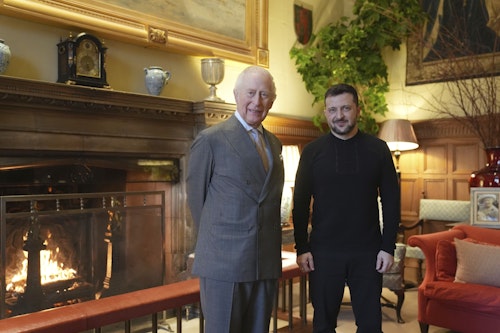
'We cannot repeat Minsk' - Antonio Costa, European council president
On leaving the extraordinary summit in London, the president of the European Council, Antonio Costa, called for lessons to be learned from the past. "We must learn from the past, we cannot repeat the Minsk experience, we cannot repeat at all Afghanistan tragedy,” the leader said as European leaders departed the summit on the future of Ukraine.
The Minsk agreements are the ceasefire agreements that were negotiated in 2014 and 2015 by the Ukrainians and Russians under the aegis of the OSCE, to put an end to the war in Donbas, the Ukrainian region annexed by Russia, the terms of which were subsequently violated by the Russians.
“We need for this strong security guarantees and peace-making with peacekeeping, then we will continue to work on a lasting peace," Costa added.
We need to turn Ukraine into 'steel porcupine' indigestible for Russia, says von der Leyen
We've just heard from Ursula von der Leyen, the president of the European Commission, who just approached reporters outside Lancaster House to give her takeaways from the London summit.
"We've had a good and frank discussion," she said. "We discussed everything."
"We have to put Ukraine in a position of strength," she added, speaking of economic, energy and military resilience.
Von der Leyen stressed the "importance" of providing security guarantees to Ukraine to turn the war-torn country into a "steel porcupine" that would be "indigestible for potential invaders" like Russia.
Then, she spoke about the need to "urgently" rearm the European Union and unleash a "surge" in defence spending that can meet the new geopolitical situation. "We really have to step up" and "prepare for the worst," she said. Von der Leyen said she would present a "comprehensive" defence plan to EU leaders when they all meet on 6 March for an emergency summit in Brussels.
Asked about whether she had a message to Donald Trump, the Commission chief called for cooperation. "We are ready, together with you, to defend democracy (and) the principle that there is a rule of law that you cannot invade your neighbour (and) change borders by force," she said.
"It's in our common interest to prevent future wars."
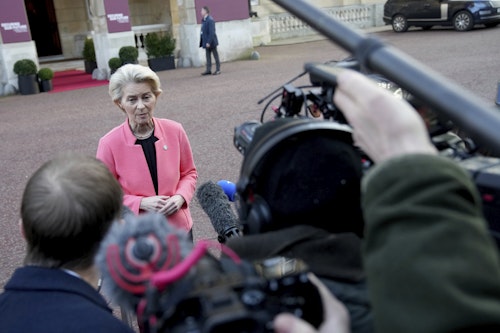
Zelenskyy catches helicopter to Norfolk to see KIng Charles
President Volodymyr Zelenskyy has now departed from Lancaster House in central London where he was in conclave with European leaders along with leaders from Turkey and Canada. Zelenskyy will now take a helicopter to Norfolk in the east of England where he will visit King Charles at his Sandringham estate.
Sánchez hugs Zelenskyy and shows support
Spanish Prime Minister Pedro Sánchez gave Ukrainian President Volodymyr Zelenskyy a big hug after posing for the family picture at the London summit.
"Spain will do everything in its power to achieve this goal and ensure the security and freedom of Europe," Sánchez wrote on social media while sharing a video of the friendly moment.
Earlier this week, Sánchez was one of the 13 Western leaders who travelled to Kyiv to show support for Ukraine on the same day of the war's third anniversary. During the visit, he announced a new package of military, financial and humanitarian support worth €1 billion.
On Friday, after Donald Trump and JD Vance laid into Zelenskyy at the Oval Office, the Spanish premier said: "Ukraine, Spain stands with you." His post on X amassed over 12 million impressions.
En Londres, para seguir trabajando con nuestros aliados en la construcción de la paz justa y duradera que Ucrania necesita.
— Pedro Sánchez (@sanchezcastejon) March 2, 2025
España hará todo lo que esté en su mano para lograr este objetivo y garantizar la seguridad y libertad de Europa. pic.twitter.com/jV0UVdkC3g
Analysis: Starmer and Macron team up to flip Trump's script
Regardless of what is agreed at the London summit, one key takeaway has already emerged: British Prime Minister Keir Starmer and French President Emmanuel Macron have flipped Donald Trump's script.
Both leaders have committed to working with Ukraine to draft a "plan to stop the fighting", which will then be presented to the United States for further discussions. The UK and France will include "one or two" other nations (possibly Germany) in this preparatory work, Starmer said in an interview with the BBC.
This approach changes the dynamic we have seen until now: at first, Trump positioned himself as the sole moderator between Ukraine and Russia, completely excluding Europeans from the process. But Trump's self-proclaimed role became increasingly challenged by his flattering rhetoric towards Vladimir Putin and his antagonistic attitude towards Volodymyr Zelenskyy, which came to a boil on Friday during the spat at the Oval Office. Europeans have been aghast at watching the American president blur the line between aggressor and aggressed and attacking Zelenskyy as a "dictator without elections."
By proposing a new working strand in the diplomatic process, Starmer and Macron invite themselves to the negotiating table, give Europe a greater voice and ensure Trump is no longer the exclusive referee calling the shots. It remains to be seen how much the US president will be willing to cede his role as the key instigator and allow the Franco-British efforts to play into the US talks.
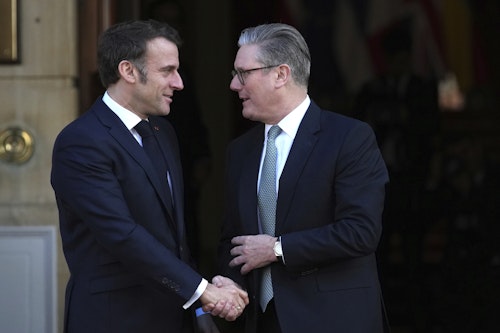
US House Speaker tells Ukraine to change leader or 'come back to the table'
US House Speaker Mike Johnson told NBC news in an interview on Sunday that Ukrainian President Volodymyr Zelenskyy “needs to come to his senses and come back to the table in gratitude or someone else needs to lead the country” in order for the country to reach a peace deal negotiated by the US. “It’s up to the Ukrainians to figure that out,” he said.
He is not the first congressman to raise the idea of a change of leadership in Ukraine since the Oval office row between Zelenskyy, US president Donald Trump and his vice-president J.D Vance. On Friday, US Senator Lindsey Graham also said that Zelenskyy “either needs to resign or send somebody over that we can do business with, or he needs to change.”
As House Speaker, Mike Johnson is third in line to succeed the US President, after the Vice-President. The Louisiana Republican said, however, that he would like “to see Putin defeated,” adding that “he’s an adversary of the US.”
Carl Bildt slams US efforts to broker peace
Sweden's former foreign and prime minister Carl Bildt - who currently heads up the think tank the European Council on Foreign Relations - has delivered a withering judgment on US President Donald Trump's attempts to broker peace in Ukraine. Bildt told the BBC in an interview that the US is currently a non-rules based regime, which has made too many concessions to Russian President Vladimir Putin.
Ex-Swedish PM slams ‘amateurish’ peace talks of ‘non-rules based’ US
Carl Billdt, the former Swedish premier, has criticised US efforts to achieve peace, claiming that Donald Trump’s administration has given too much ground to V…
Olaf Scholz joins London summit as Friedrich Merz waits in the wings
German Chancellor Olaf Scholz is one of the leaders taking part in the Ukraine summit hosted by British Prime Minister Keir Starmer. But unlike the other leaders in the room, Scholz will soon depart office after his Social Democratic Party (SPD) took a tumble in the parliamentary elections last month. The SPD is now in talks to become the junior partner of a coalition led by the centre-right Christian Democratic Union (CDU).
This makes Friedrich Merz, the CDU leader, the frontrunner to become Germany's next Chancellor.
Merz has promised to adopt a more decisive attitude against Russia's war of aggression, including by sending Taurus cruise missiles to Ukraine. Scholz has repeatedly opposed supplying this powerful type of weapon, arguing it could escalate the violence and drag Germany further into the conflict.
Merz has also spoken critically about Donald Trump's pivot towards Vladimir Putin. “It is clear that the Americans, at least this part of the Americans, this administration, are largely indifferent to the fate of Europe," Merz said last month, adding he was "very curious" to see whether, in a few months, "we will still be talking about NATO in its current form or whether we will have to establish an independent European defence capability much more quickly."
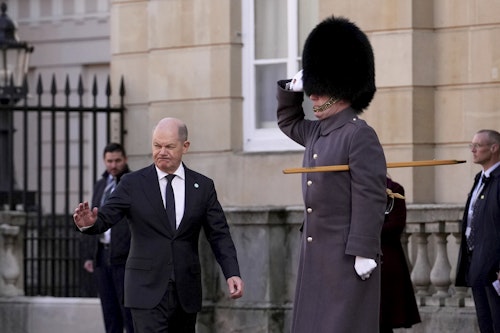
Who's who in the family picture?
Let's break down the family picture of the Ukraine summit in London.
First row, from left to right:
- Finnish President Alexander Stubb
- French President Emmanuel Macron
- British Prime Minister Keir Starmer
- Ukrainian President Volodymyr Zelenskyy
- Polish Prime Minister Donald Tusk
Second row, from left to right:
- Spanish Prime Minister Pedro Sánchez
- Danish Prime Minister Mette Frederiksen
- European Commission President Ursula von der Leyen
- European Council President António Costa
- Canadian Prime Minister Justin Trudeau
- Romanian President Ilie Bolojan
Third row, from left to right:
- NATO Secretary General Mark Rutte
- Dutch Prime Minister Dick Schoof
- Swedish Prime Minister Ulf Kristersson
- German Chancellor Olaf Scholz
- Norwegian Prime Minister Jonas Gahr Støre
- Czech Prime Minister Petr Fiala
- Italian Prime Minister Giorgia Meloni
- Turkish Foreign Affairs Minister Hakan Fidan
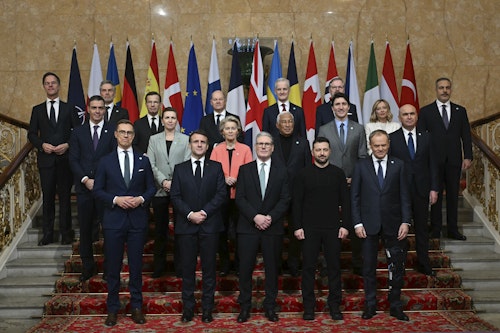
Zelenskyy meets Meloni before London summit
Ukrainian President Volodymyr Zelenskyy met his Italian counterpart Giorgia Meloni shortly before the leaders summit in London.
Following that meeting, Zelenskyy wrote on X that the meeting was “productive” and that the two leaders talked about developing a plan to end the war with “a just and lasting peace.”
“No one other than Putin is interested in the continuation and quick return of the war,” the Ukrainian leader added.
While western allies are gathered, without the US, for an extraordinary summit, Zelenskyy wrote that it was important to “strengthen” Ukraine’s position “in cooperation with our allies – the countries of Europe and the United States.”
I had a productive meeting with the President of the Council of Ministers of Italy @GiorgiaMeloni to develop a joint action plan for ending the war with a just and lasting peace.
— Volodymyr Zelenskyy / Володимир Зеленський (@ZelenskyyUa) March 2, 2025
No one other than Putin is interested in the continuation and quick return of the war. Therefore, it… pic.twitter.com/3xCF7qTiCv
A 'once in a generation moment' – UK Prime Minister
As European and world leaders arrived at Lancaster House, in London on Sunday for a special summit on Ukraine and the security of the European continent. UK Prime Minister Sir Keir Starmer told the leaders freshly arrived that they need to step up to a “once in a generation moment” for the security of Europe.
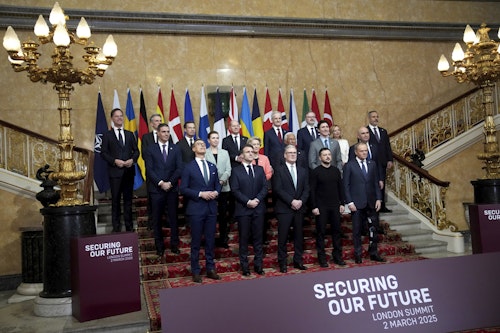
Donald Tusk arrives with a limp
Polish Prime Minister Donald Tusk was seen limping as he made his way into Lancaster House and was received by the host, British Prime Minister Keir Starmer.
Tusk's limp, which considerably slowed down his walking, is due to a skiing accident, according to a Polish spokesperson.
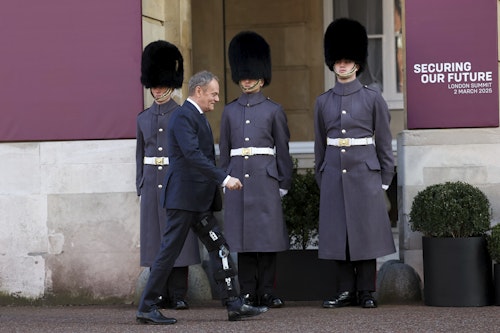
Keir Starmer spoke with Baltic leaders ahead of London summit
Earlier on Sunday, British Prime Minister Keir Starmer held a video conference with the three leaders of the Baltic states, none of whom are in attendance at the Ukraine summit in London despite their proximity to Russia. The Baltics have repeatedly warned that should Vladimir Putin prevail in Ukraine, he could potentially target the three small countries as his next target.
Estonian President Alar Karis, Latvian Prime Minister Evika Siliņa and Lithuanian President Gitanas Nausėda joined the call with Starmer. "We agreed that we must come together to find a path towards a lasting peace in Ukraine that ensures their sovereignty and is backed up by strong security guarantees," Starmer said on social media. "This is vital for the UK and Europe’s future security."
Latvia's Evika Siliņa stressed it was "crucial" for the three Baltic states to remain "involved" in the diplomatic process and said she had "received confirmation" that NATO's Article 5 of collective defence "remains steadfastly in force, including from the US side." It appeared that this "confirmation" was delivered by Starmer himself, who met Donald Trump earlier this week, rather than by the US itself.
Meanwhile, Lithuania's Gitanas Nausėda urged the US and Ukraine to "return to the negotiation table, together with Europeans" and endorsed the idea of a European peacekeeping force as a "possible element of security guarantees for Ukraine."
"We should not spare our effort to maintain a strong transatlantic bond," Nausėda said.
Speaking with President @AlarKaris, Prime Minister @EvikaSilina and President @GitanasNauseda, we agreed that we must come together to find a path towards a lasting peace in Ukraine that ensures their sovereignty and is backed up by strong security guarantees.
— Keir Starmer (@Keir_Starmer) March 2, 2025
This is vital for… pic.twitter.com/oSN77HNBhY
'All in Europe will need to give more' - NATO chief
On his arrival at the leaders' meeting, NATO Secretary-general Mark Rutte said on X that “all in Europe will need to give more” to support Ukraine. “We all want a peace deal, and it has to last,” he wrote, adding that “Europe is really stepping up.” NATO’s chief also said: “To keep NATO strong, Europe will increase defence spending.”
Very positive heading into today’s meeting in London. Three key points:
— Mark Rutte (@SecGenNATO) March 2, 2025
1. Support Ukraine today. All in Europe will need to give more
2. We all want a peace deal, and it has to last. Europe is really stepping up here
3. To keep NATO strong, Europe will increase defence spending pic.twitter.com/ZMLu3ncXM2
Zelenskyy arrives at the London summit
Ukrainian President Volodymyr Zelenskyy has arrived at the London Summit.
The gathering of European leaders follows a row in Washington on Friday between Zelenskyy, US President Donald Trump and his vice-president J.D Vance, plunging Western allies into an unprecedented crisis. The Ukrainian President left the US without signing a touted agreement with the US for the exploitation of minerals in Ukraine.
Zelenskyy was then warmly received on Saturday by his British counterpart, Prime Minister Sir Keir Starmer, before the two signed a £2.26bn loan for Ukrainian military supplies, that will be repaid using profits from frozen Russian assets.
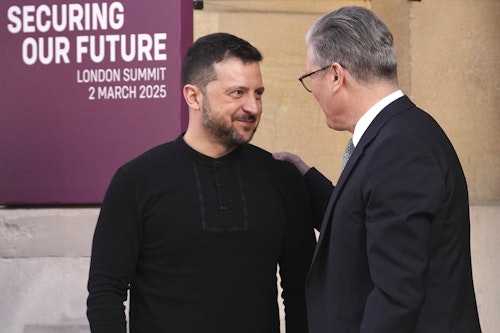
Turkey's Foreign minister in London with offer to host peace summit
Turkey's Foreign minister Hakan Fidan has arrived at Lancaster House in central London, with several other leaders, including Commission's president Ursula von der Leyen, Canadian Prime minister Justin Trudeau, French President Emmanuel Macron, Polish Prime Minister Donald Tusk and NATO Secretary-general Mark Rutte.
Reuters is reporting that Fidan will offer for Turkey to host peace talks between Ukraine and Russia during the summit.
Since 2024, Turkey, a NATO-member, has called for a cease-fire.
In 2022 it hosted key talks between Ukraine and Russia to help secure a corridor for the passage of grain exports in the Black Sea. Ukraine has struggled to export goods, with ports blocked on its southern coast because of the war.
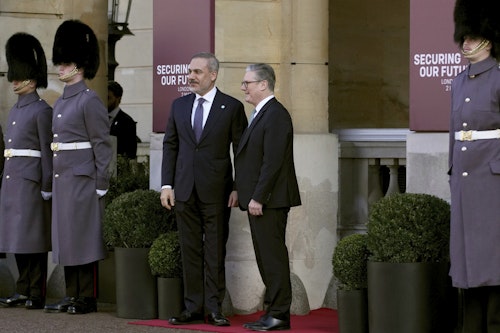
French President Emmanuel Macron arrives at Lancaster House
Macron arrived at Lancaster House in London around 12.45 local time, and was welcomed by Prime Minister Keir Starmer.
Starmer earlier revealed the French President would join him in drafting a proposal for a ceasefire in Ukraine to be presented to the US, describing London and Paris as "advanced" in terms of their readiness to contribute towards security guarantees.
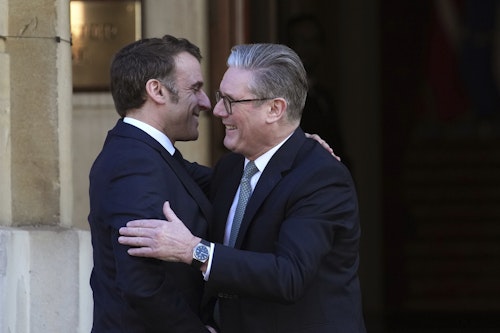
Goals are 'stepping up' European defence and 'lasting peace' in Ukraine: European Council President
The President of the European Council Antonio Costa said on X that the "goals" are clear as leaders gather in London: "stepping up European defence and creating the conditions for a lasting peace in Ukraine."
Costa will host the EU's 27 leaders for an extraordinary summit in Brussels on Thursday focused specifically on strengthening the bloc's support to Kyiv.
In London to participate in a summit organized by UK PM @Keir_Starmer on Ukraine.
— António Costa (@eucopresident) March 2, 2025
The EU is working with its partners to support Ukraine and reach a just and lasting peace.
Preparations are ongoing with all EU member states for the Special #EUCO on 6 March. The goals are clear:…
We should 'maintain a strong transatlantic bond': Lithuania's Nauseda
Lithuanian President Gitanas Nauseda said following a virtual meeting with the leaders of Latvia, Estonia, and Britain on Sunday that maintaining a "strong transatlantic bond" should remain a priority for Europe.
The four leaders held their meeting before Starmer hosts other leaders from Europe and Canada, as well as Turkey's foreign minister, in London for a summit on Ukraine.
Nauseda also said that the US and Ukraine "should return to the negotiation table, together with Europeans", that the safety of NATO's eastern flank "is a priority" and that a European peacekeeping mission in Ukraine could be "a possible element of security guarantees".
Had an important discussion with UK Prime Minister @Keir_Starmer and other Baltic leaders.
— Gitanas Nausėda (@GitanasNauseda) March 2, 2025
My takeaways:
- We should not spare our effort to maintain a strong transatlantic bond.
- US and Ukraine should return to the negotiation table, together with Europeans.
- NATO eastern…
'This is the moment we have to work together as transatlantic partners': Kallas
The EU's top diplomat said in an interview released on Sunday that Europe and the US must continue to cooperate together and keep putting political and economic pressure on Russia.
"We need to really make sure that Russia doesn't attack again and, for that, we need to concentrate our efforts, I mean putting political and economic pressure on Russia to stop this war but at the same time also help Ukraine to defend itself," Kaja Kallas told CBS's Face the Nation.
"We have always been good allies. We have been working together and have been friends and allies on what comes to the world, in different parts of the world," she said of EU-US relations.
"We have been cooperating, whether it comes to Ukraine, whether it comes to the Middle East, and in the world, we see powers like Russia, North Korea, Iran and more covertly China, working together and I think this is the moment where we have to work together as transatlantic partners," she added.
Kallas travelled to Washington earlier this week to meet US officials. A scheduled meeting with Secretary of State Marco Rubio was however cancelled due to "scheduling issues"
We need to make sure that Russia doesn’t attack again.
— Kaja Kallas (@kajakallas) March 2, 2025
And for that, we need to put political and economic pressure on Russia to stop this war, and at the same time, also help Ukraine defend itself.
Extract from my interview @FaceTheNation ↓ pic.twitter.com/xDE1hWz6RG
'Important we avoid the risk that the West divides': Italy's Meloni
Italian Prime Minister Giorgia Meloni has arrived in London where she is holding a bilateral meeting with Britain's Keir Starmer ahead of a summit with over a dozen other leaders from Europe and Canada this afternoon.
In remarks delivered before the press before their meeting behind closed doors, Meloni said it is "very, very important that we avoid the risk the West divides (sic)."
"We are all very committed about a goal we all want to achieve which is a just and lasting peace in Ukraine," she said, adding that "if we divide ourselves that will make us all weaker."
"Italy and UK can play an important role in bridge-building," she said.
Meloni, who was the only European leader to have been invited to and attended Donald Trump's presidential inauguration in January, has called for an EU-US summit following the Oval Office bust-up between Volodymyr Zelenskyy and Trump on Friday.
She said in a statement the summit would allow all to "talk frankly about how we intend to deal with the great challenges of today, starting with Ukraine, which together we have defended in recent years, and those that we will be called upon to face in the future."
Starmer meanwhile told Meloni that he was "very much looking forward to having the opportunity today to talk to you about the important issues facing us," highlighting their "very similar mindset" on a number of issues.
Czech PM suggests European countries should increase defence spending to 3% of GDP
Petr Fiala, the prime minister of the Czech Republic, has said on X that Europe needs to "provide even more military support to Ukraine" and strengthen its own defence and security, "for example, increasing defence spending to at least 3% of GDP and bringing European defence investments closer to those of the United States".
"Europe must be strong. Strength means the ability to put money and weapons on the table," Fiala added.
NATO Secretary-General Mark Rutte recently suggested NATO allies need to be prepared to boost defence spending to more than 3% - and as much as 3.7% - of GDP.
Odlétám do Londýna na summit zemí, které berou bezpečnost Evropy vážně.
— Petr Fiala (@P_Fiala) March 2, 2025
Evropa musí převzít odpovědnost za vlastní bezpečnost a naším cílem musí být spravedlivý a trvalý mír, který nebude obcházen a zpochybňován.
Proto musíme udělat dvě věci: ještě více vojensky podporovat… pic.twitter.com/b7DRwCgKbz
Ukraine to 'keep working with all of our partners' to achieve peace: Sybiha
Andrii Sybiha, Ukraine's foreign minister, said on Sunday that the country "will keep working with all of our partners" to achieve "a just and lasting peace that guarantees our people the security they deserve".
Writing on X before a meeting of leaders from Europe and Canada in London this afternoon, Sybiha also said that "no country in the world wants peace in Ukraine more than Ukraine itself" and that "no one works harder to achieve it than President Volodymyr Zelenskyy".
Sybiha was in London yesterday for a meeting with British Foreign Secretary David Lammy.
No country in the world wants peace in Ukraine more than Ukraine itself. And no one works harder to achieve it than President @ZelenskyyUa—a just and lasting peace that guarantees our people the security they deserve. We will keep working with all of our partners to achieve it.
— Andrii Sybiha 🇺🇦 (@andrii_sybiha) March 2, 2025
Giorgia Meloni arrives to 10 Downing Street
Italian Prime Minister Giorgia Meloni has arrived at 10 Downing Street for bilateral talks with Keir Starmer ahead of the leaders' summit.
Meloni and Starmer have struck cordial relations since the UK prime minister entered government last July.
Seventeen other leaders will then join the pair at a summit on Ukraine and Europe's defence that will take place at Lancaster House, a West London mansion used for diplomatic receptions.
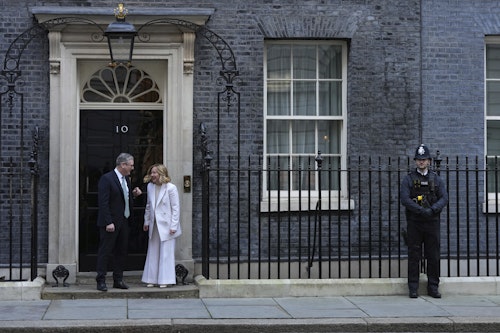
EU-US summit 'very necessary': Poland's Tusk
Donald Tusk, Poland's prime minister, told reporters on Sunday morning before boarding a plane to London that he supports Giorgia Meloni's initiative to convene an EU-US summit, saying that the bloc needs "to have the closest possible
alliance" with Washington.
"We have a certain dilemma, the position of the Washington administration is not as clear as our position on the Ukraine-Russia issue. We can see this, but we have to transcend this dilemma," Tusk said.
An EU-US summit "seems very necessary indeed", he also said, adding: "It is good that it was proposed by Prime Minister Meloni to President Trump, because of their very good relationship. Perhaps it will have a positive effect."
Europe "will not be an alternative to America", Tusk said, despite the fact it "has awakened" and is coming into its "global potential".
"Today in Europe there is such a deficit of imagination and courage. Europe needs to understand its strength," he said, citing figures from the International Institute for Strategic Studies which found that there are more professional soldiers and artillery in Europe and Ukraine than in the US, China, or Russia.
He said he will "loudly demand" that European countries strengthen the eastern flank through "a much greater presence of European troops in Finland, in the Baltic States and in Poland, on the border with Russia and Belarus".
US foreign policy vision 'coincides' with Russia's - Kremlin spokesperson
The shift in the US's foreign policy "largely coincides" with Moscow's vision, the Kremlin's spokesperson Dmitry Peskov has told Russian state TV, AFP reports.
"There is a long way to go, because there is huge damage to the whole complex of bilateral relations. But if the political will of the two leaders, President Putin and President Trump, is maintained, this path can be quite quick and successful," Peskov said in remarks reportedly made on Wednesday but aired on Sunday.
Starmer says the UK and France will draft ceasefire plan with Ukraine
In an interview with the BBC on Sunday morning, UK Prime Minister Keir Starmer said that the UK and France will work with Ukraine to draw up a ceasefire plan to be presented to the United States.
The initiative came about after Starmer's telephone diplomacy with Ukrainian President Volodymyr Zelenskyy, US President Donald Trump and French President Emmanuel Macron following the acrimonious fallout between Zelenskyy and Trump in the Oval Office on Friday.
Other European countries could also be involved in drawing up the proposal, Starmer suggested.
The British prime minister has previously expressed openness to sending British troops as part of a potential peacekeeping contingent to Ukraine, but insists on the US providing security guarantees in the form of a 'backstop' to deter Russia from breaking the conditions of a ceasefire.
“I’ve always been clear that that is going to need a US backstop because I don’t think it would be a guarantee without it, I don’t think it would be a deterrent without it, so the two have to go together," Starmer told the BBC.
"So for me the components of a lasting peace are a strong Ukraine to fight back if necessary, to be in a position of strength to negotiate, a European element of security guarantees (...) and a US backstop."
“That’s a package - all three parts need to be in place, and that’s what I’m working hard to bring together.”
Starmer says UK, France to work with Ukraine on ceasefire plan
The UK prime minister says London and Paris will take the lead on drawing up a plan to ‘stop the fighting’, which will then be presented to US President Donald…
Where is the human element in these peace negotiations?
Any peace process between Kyiv and Moscow must include the release of Ukrainians detained by Russia and compensation for Ukraine through the seizure of frozen Russian assets, Nobel Peace Prize winner Oleksandra Matviichuk said.
"Peace negotiations must get the victims of war released and the war criminals punished. We must ensure that Ukrainian democracy is protected," Matviichuk wrote in an exclusive opinion piece published on Euronews.
She also argued that NATO membership is "the most compelling" security guarantee Western allies can provide the country and that "tough sanctions" against Moscow must remain in place "until Russia vacates all occupied Ukrainian territory"
"Frozen Russian assets should be seized and used for Ukraine's defence, to compensate victims, and to rebuild Ukraine's economy and infrastructure," she said.
Read more here:
Where is the human element in these peace negotiations?
As Ukrainians, we continue to fight for our lives, and this fight for a peace deal that protects us for the future is one of the most urgent and important batt…
Europe must see itself as 'a global power': Tusk
Polish Prime Minister, Donald Tusk, who is scheduled to attend the meeting in London this afternoon, said on X this morning that Europeans "have to rely on ourselves, being fully aware of our own potential and believing that we are a global power".
"The paradox is that 500 million Europeans are asking 300 million Americans to defend them against 150 million Russians," he wrote.
💬 Premier @DonaldTusk w #Warszawa: Paradoks polega na tym, że 500 milionów Europejczyków prosi 300 milionów Amerykanów, by obronili ich przed 150 milionami Rosjan. Musimy liczyć na siebie, mając pełną świadomość własnego potencjału i wiarę w to, że jesteśmy globalną potęgą.
— Kancelaria Premiera (@PremierRP) March 2, 2025
'Weakness breeds more war': von der Leyen
Ursula von der Leyen, the president of the European Commission, posted on X this morning that she will "highlight Europe’s ongoing support to Ukraine that can lead to just and lasting peace in Ukraine" during the meeting in London this afternoon.
"The path to peace is strength. Weakness breeds more war. We will support Ukraine, while undertaking a surge in European defence," she added.
Von der Leyen said earlier this week that she would aim to set up a new EU instrument to "enable more targeted and efficient defence spending".
Areas the EU wants to focus defence spending on include air and missile defence; artillery systems, missiles and ammunition; drones and anti-drone systems; strategic enablers and critical infrastructure protection; cyber; artificial intelligence and electronic warfare.
Last month, von der Leyen told the Munich Security Conference that she would propose to activate the escape clause in the bloc's fiscal rules to exclude defence spending from member states' deficit and debt calculations.
Other measures under discussion to boost defence spending across the EU are an update to investment rules to enable more private capital to flow into the defence sector and the issuing of so-called Eurobonds.
On my way to London to highlight Europe’s ongoing support to Ukraine that can lead to just and lasting peace in Ukraine.
— Ursula von der Leyen (@vonderleyen) March 2, 2025
The path to peace is strength.
Weakness breeds more war.
We will support Ukraine, while undertaking a surge in European defence.
Analysis: Starmer aims to straddle US-Europe divide with defence summit
UK Prime Minister Sir Keir Starmer finds himself walking a tightrope between the US and European allies after the Zelenskyy-Trump fallout in the Oval Office.
While several European leaders rallied behind Zelenskyy after he was unceremoniously kicked out of the White House on Friday, Starmer has been more cautious, speaking with both Zelenskyy and Trump in the immediate aftermath of their bust-up.
Earlier in the week on Thursday, Starmer launched a full charm offensive in Washington, extending an “unprecedented” invitation from King Charles for Trump to attend a second state visit and talking up the importance of the “special relationship”. He also pledged to boost UK defence spending to 2.5% by 2027 ahead of his visit, dancing to Trump’s tune.
But while the optics of that meeting were positive, Starmer did not return to London with any of the guarantees he was seeking that the US would back up a potential European peacekeeping contingent with security guarantees.
On Saturday, Starmer warmly embraced Zelenskyy outside 10 Downing Street, and the Ukrainian President is expected to be received by King Charles on Sunday morning.
Starmer has previously rejected the notion that the UK needs to choose between Europe or a Trump-led US amid strained trans-Atlantic relations.
His Labour-led government is also pursuing a defence and security deal with the European Union and wants closer trade ties with the bloc, five years since the UK’s formal EU exit.
Italian Prime Minister Giorgia Meloni, the only leader to have been invited and attended Trump’s inauguration ceremony, has also positioned herself as a potential bridge between Kyiv and Washington, calling for an urgent US-Europe summit. She will meet bilaterally with Starmer this morning.
Can EU member states create such 'coalitions of the willing'?
EU foreign policy is subject to unanimity, meaning that all 27 member states must approve any measure, such as sanctions for instance.
But Article 44 of the Treaty on European Union plans for the creation of such coalitions of the willing in the Common Security and Defence Policy (CSDP). It states:
- Within the framework of the decisions adopted in accordance with Article 43, the Council may entrust the implementation of a task to a group of Member States which are willing and have the necessary capability for such a task. Those Member States, in association with the High Representative of the Union for Foreign Affairs and Security Policy, shall agree among themselves on the management of the task.
- Member States participating in the task shall keep the Council regularly informed of its progress on their own initiative or at the request of another Member State. Those States shall inform the Council immediately should the completion of the task entail major consequences or require amendment of the objective, scope and conditions determined for the task in the decisions referred to in paragraph 1. In such cases, the Council shall adopt the necessary decisions.
This article has, for now, never been used. But, it could in theory allow for some member states to work together to provide security guarantees for Ukraine. It would, however, require the unanimous backing of all member states for such a coalition of the willing to be established.
Let's consider a coalition of the willing: Czech President
Petr Pavel, the president of the Czech Republic, wrote late last night that "the time has come to start considering a broad coalition of the willing for a just peace in Ukraine".
""Peace" on terms of the aggressor is called a capitulation and would only encourage all current and future aggressors. Free world must stand up to the evil," he added.
Reminder: the leaders of Hungary and Slovakia said on Saturday that they would veto new EU efforts to boost military aid to Ukraine, an issue that requires unanimity from the 27 member states. That could prompt a group of like-minded member states to work together to deepen support for Kyiv, known as a 'coalition of the willing'.
The time has come to start considering a broad coalition of willing for just peace in Ukraine. “Peace” on terms of the aggressor is called a capitulation and would only encourage all current and future aggressors. Free world must stand up to the evil.
— Petr Pavel (@prezidentpavel) March 1, 2025
Turkey expected to repeat offer to host peace talks
Turkish foreign minister Hakan Fidan is expected to repeat the country's offer to host potential peace talks between Ukraine and Russia in London on Sunday, Reuters reports citing a Turkish official.
NATO ally Turkey has kept channels of communication with Russia open since the start of the full-scale invasion in February 2022 while also maintaining good ties with Ukraine. It also hosted both sides for successful talks on the passage of grain exports in the Black Sea during the first months of war.
Turkish President Recep Tayyip Erdoğan said last month following a meeting with Zelenskyy that Ankara would uphold Ukraine’s sovereignty and territorial integrity in any future peace talks.
While supporting the US-led push for peace talks, Erdoğan also criticised the initial exclusion of both Ukraine and Europe from the negotiations.
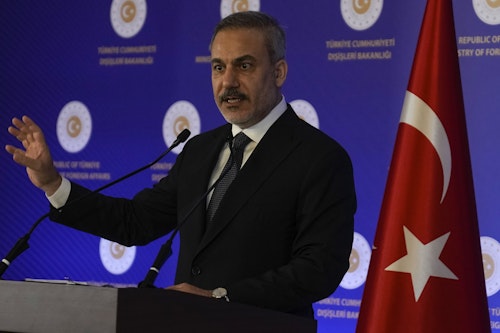
UK newspapers in show of support for Zelenskyy
British front pages this morning are effusive in their support for Volodymyr Zelenskyy and his war-torn country following his meeting on Saturday with Prime Minister Keir Starmer.
The Daily Mail splashes with a call from MPs to cancel "the state visit for 'bully' Trump".
The Sunday Mirror and Sunday Telegraph similarly went with a picture of Starmer and Zelenskyy, respectively writing "We've got your back" and "You are very welcome to No 10".
The Independent and the Observer both focused on the meeting today between King Charles and Zelenskyy, with the Indy writing that "King Charles shows solidarity with Zelenskyy", and the Observer leading with the "Royal welcome".
THE MAIL ON SUNDAY: Now stop the state visit for 'bully' Trump #TomorrowsPapersToday pic.twitter.com/ZxmvHKamby
— Alfie Tobutt (@AlfieTobutt) March 1, 2025
Military aid to Ukraine should be 'today rather than tomorrow': Denmark's Frederiksen
Danish Prime Minister Mette Frederiksen said in a statement released ahead of her visit to London for a meeting with other leaders this afternoon that "Europe must stand together and deliver more military support" to Ukraine.
"Today rather than tomorrow," she added.
"And we must ensure the necessary security guarantees so that the war does not simply return to Ukraine or another country," she also wrote.
Møde om støtten til Ukraine i London pic.twitter.com/VXKpxrudHa
— Statsministeriet (@Statsmin) March 2, 2025
Good morning and welcome to our live blog
Here’s what to expect today as world leaders gather in London to discuss Ukraine’s future.
- Sir Keir Starmer will first host Italian Prime Minister Giorgia Meloni in Downing Street for a bilateral meeting this morning.
- 17 further leaders, including Ukrainian President Volodymyr Zelenskyy, will then join the pair for discussions on continuing support to Kyiv, and a potential peace plan.
Who’s attending?
Overnight, Downing Street confirmed the participation of the leaders of Ukraine, France, Germany, Denmark, Italy, Netherlands, Norway, Poland, Spain, Canada, Finland, Sweden, Czechia and Romania, the Turkish foreign minister, the presidents of the European Commission and European Council, and the NATO secretary-general.
The gathering was originally intended for European leaders, but has expanded into an international summit after Canadian Prime Minister Justin Trudeau confirmed his participation overnight.
Zelenskyy and Starmer tie up meeting
Volodymyr Zelenskyy has left 10 Downing Street after his meeting with Prime Minister Sir Keir Starmer, who waved the Ukrainian leader off as he left.
That's it for our live coverage today. Please tune in for live coverage of Sunday's crisis summit.
Starmer will welcome European from France, Germany, Denmark, the Netherlands, Norway, Poland, Spain, Turkey, Finland, Sweden, the Czech Republic and Romania and the presidents of the European Council, European Commission and NATO Secretary General.
He'll meet for talks with Italy's Prime Minister Giorgia Meloni before the main summit, which aims at securing “lasting and enforced” peace in Ukraine.
Zelenskyy will also meet King Charles at his Norfolk estate, Sandringham.
UK signs new loan agreement with Ukraine to support defence capabilities
The UK granted Ukraine a new £2.6 billion loan today to "enable you to use the funds in the way that you best see fit - including for military procurement so you can better better defend your country,” UK Chancellor of the Exchequer, Rachel Reeves told her Ukrainian counterpart, Serhiy Marchenko. The loan is part of a broader G7 initiative set up last year.
“This money is about securing the territorial integrity of Ukraine [...] but it’s bigger than that. It is about the security and prosperity of all of Europe,” she said. She also highlighted UK cross-party support for the loan when adopted by the Parliament.
The money should be available in the next few days, because of the rapid needs for the funds, Reeves said. This help is in addition to the £3 billion a year on the ongoing support from the UK to Ukraine.
She indicated that the loan will be paid through profits of confiscated sovereign Russian assets.
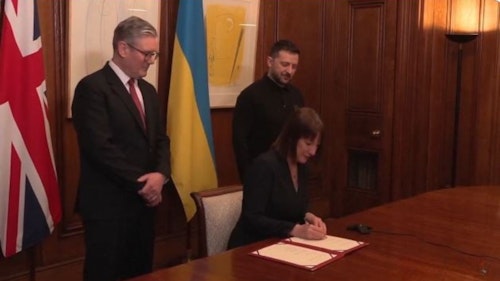
Viktor Orban: Ukraine's 'exhausted' and 'on life support'
In a video shared with English subtitles on social media platform X, the Hungarian president reflects on the Oval Office clash offering its own interpretation of the event, saying, "Donald Trump essentially kicked him [Zelenskyy] out of the White House."
While praising Trump’s pledge to seek peace in Ukraine, Orban criticises the Ukrainian president’s refusal to negotiate a ceasefire.
He describes Ukraine as “completely exhausted” and “on life support”, referring to its reliance on foreign financial aid.
In a letter released earlier today, Orban urged the European Union not to make any formal decisions during the European Summit on March 6, where European defence will be the focal point. Addressing EU Council President Antonio Costa, he pointed to “strategic differences” over Ukraine, which, he asserts, cannot be reconciled.
President @realDonaldTrump is doing exactly what he promised during the campaign: he is doing everything he can to bring about peace. pic.twitter.com/3ykh3dtQQZ
— Orbán Viktor (@PM_ViktorOrban) March 1, 2025
US Treasury secretary claims Zelenskyy twice rejected minerals deal
US Treasury Secretary Scott Bessent has has told Fox News that Volodymyr Zelenskyy refused twice to sign a minerals deal with the US.
"This has to be one of the greatest diplomatic mishaps of all time by President Zelenskyy," Bessent told the channel's Laura Ingraham in an interview.
Bessent said that Zelenskyy told him during a meeting in Kyiv that he would not sign a mineral deal, which would exchange billions of dollars in US aid funding for rare earths and other resources from Ukraine.
Zelenskyy also refused the deal with Vice President JD Vance and Secretary of State Marco Rubio, Bessent claimed in the interview.
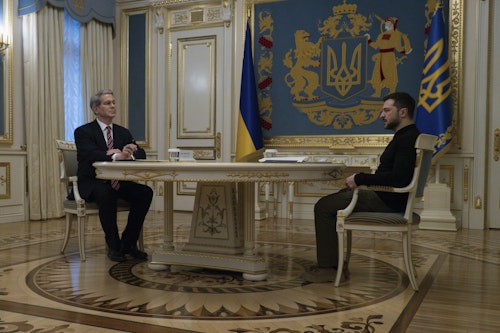
Bessent with Zelenskyy. Picture: AP
For Zelenskyy, the reception in London is a welcome change
As we've just reported, President Volodymyr Zelenskyy has just been greeted at 10 Downing Street by Prime Minister Keir Starmer. You don't have to be an expert on body language or diplomatic protocol to realise the stark difference between today's reception in London and yesterday's in Washington.
On Friday, as soon as he arrived at the White House, Donald Trump quipped, "He's all dressed up today," in reference to Zelenskyy's trademark military clothing. The derisive tone set the scene for the debacle later inside the Oval office, with Trump and his vice president, JD Vance, taking turns at talking down to the Ukrainian president.
But on Saturday, Zelenskyy was welcomed with evident warmth and respect by Starmer. The two leaders shook hands, hugged and smiled with complicity in front of the eager photographers waiting outside. Since the start of the war, Britain has been one of the staunchest supporters of Ukraine, doing so in a consistent bipartisan manner. Conservative and Labour governments have sent sizable supplies of modern weapons and financial aid with limited to no opposition. Opinion polls show strong backing for the nation at war and its democratically elected president. In fact, Britain was among the first to declare its official willingness to send peacekeeping troops to Ukraine.
By contrast, support for Ukraine in the US has fractured along partisan lines. The Trump-supporting base of the Republican Party is vehemently critical of the military and financial assistance sent to Kyiv. JD Vance once declared, “I don't really care what happens to Ukraine."
Photo credit: Associated Press.
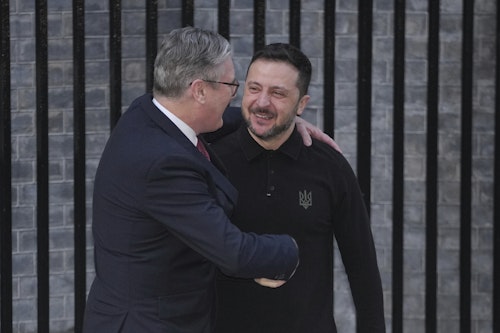
Zelenskyy and Starmer open discussions as UK leader reaffirms support
With a tense demeanour and wearing the same outfit as the previous day, the Ukrainian president was welcomed by the British Prime Minister at his residence in Downing Street.
The two leaders took a moment to pose for the throngs of photographers and journalists gathered, smiling widely and holding hands.
A large crowd had assembled outside, a fact highlighted by Starmer during a brief exchange between the leaders in front of the press. "As you heard from the cheers of the protesters outside, you have full backing across the United Kingdom," he said, adding, he will "stand with you and Ukraine for as long as it takes". He reaffirmed his "unwavering determination" to support Ukraine.
Meanwhile, Zelenskyy repeatedly expressed his gratitude for the aid provided by the UK. This came after American Vice President JD Vance had criticised Zelenskyy the day before for allegedly failing to acknowledge the support of the US and its people.
The two leaders are now set to discuss the previous day's incident and explore security guarantees for a lasting peace in Ukraine.
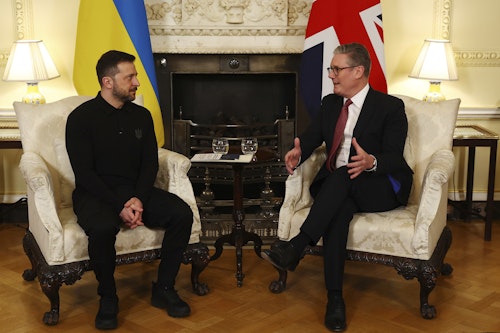
US national security adviser tells Fox News Ukrainian ambassador in tears after meeting
The Ukrainian ambassador to the US, Oksana Markarova, was “practically in tears” after yesterday's Oval office spat, US National Security Adviser Mike Waltz has told Fox News.
“His ambassador and his adviser were practically, I mean, they were practically in tears wanting this to move forward,” said Waltz. “But Zelenskyy was still argumentative.”
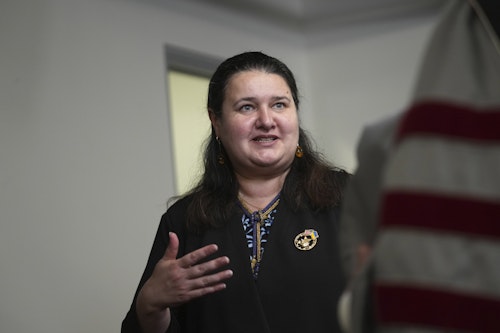
Waltz said he told Trump afterwards “that after that insult in the Oval Office we just do not see how that can move forward”.
Zelenskyy was asked to leave the White House by Waltz after the meeting.
White House deputy chief of staff Dan Scavino shared a video clip of Markarova reacting during Friday’s hostile exchange between Trump and Zelenskyy.
“Ukrainian Ambassador understands that Zelenskyy is a complete and total disaster…,” Scavino wrote in the post.
Churchill looks on as Zelenskyy is berated for dressing like a war leader in White House
A particularly awkward moment during yesterday's Oval Office’s clash came with a question from an American journalist regarding Zelenskyy's choice of outfit: “Why don’t you wear a suit? Do you own a suit?” asked Brian Glenn, White House reporter with Real America’s Voice, a right wing channel which has promoted, who he is married to Marjorie Taylor Greene, a Georgian Republican congresswoman who has herself promoted antisemitic and white supremacist views.
Earlier, Donald Trump was heard saying, "He is all dressed up today," when he welcomed Zelenskyy at the White House entrance.
Why doesn't Zelenskyy wear a suit?
Since the onset of the war in 2022 Volodymyr Zelenskyy has been seen wearing olive green jumpers, emblazoned with the Ukrainian trident, alongside combat boots.
It is a signal to the world that his country is still at war and active on the battle field - and also reflects his solidarity with the armed forces and those fighting on the frontline.
“You’re at the highest level in this country’s office, and you refuse to wear a suit,” the reporter jibed. However, the Ukrainian president is not the first to wear such an outfit at the White House.
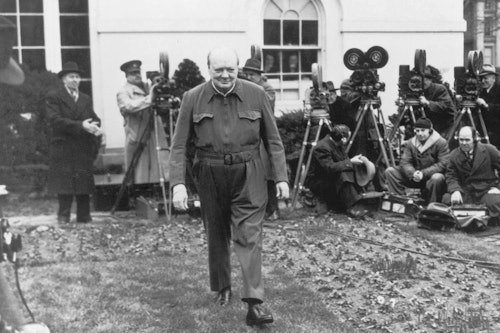
When visiting the White House in 1941during World War Two - British Prime Minister Winston Churchill wore a one-piece romper suit, intended for wear in the event of an air raid. Trump is an admirer of Churchill, whose bust watched silently over yesterday's Oval office spat from a table behind the US president.
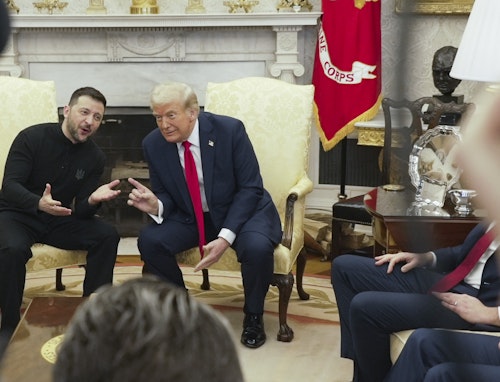
“I will wear a suit when the war is over,” Zelenskyy, who previously always wore suits, told the journalist.
NATO chief calls Zelenskyy to 'restore' his relations with Trump
In an interview with the BBC, NATO's Secretary General Mark Rutte explained that he had twice spoken to Ukrainian President Volodimir Zelenskyy on the phone and told him: “I think you have to find a way to restore your relationship with Donald Trump and the American administration," Euronews' Peggy Corlin reports.
The NATO chief also said he told Zelenskyy: “We need to stick together, the United States, Ukraine and Europe, to bring Ukraine to a durable peace.”
According to Rutte, Trump is “committed to bring Ukraine to a durable peace.”
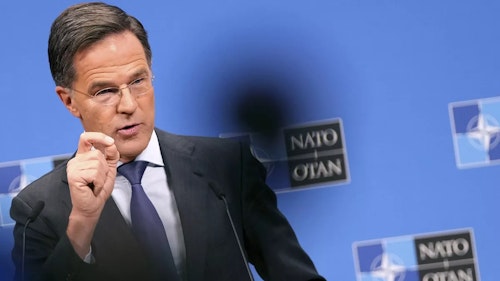
Robert Fico joins Orbán and threatens to hijack next week's EU summit
Robert Fico, the prime minister of Slovakia, has joined Viktor Orbán, a like-minded ally, in threatening to veto the joint conclusions of next week's emergency EU summit, where leaders will attempt to come up with new proposals to support Ukraine. The summit was convened before the Zelenskyy-Trump spat at the White House and now has an even greater sense of urgency.
But Fico has other ideas. In a statement shared on social media, Fico says the approach of "peace through strength" (which Trump and his deputies previously endorsed) is "unrealistic" because "Ukraine will never be strong enough to negotiate from a position of military power."
Fico then says he will demand the inclusion of an "immediate ceasefire" in the summit's conclusions, something all but guaranteed to be rejected. Ukraine has warned that a quick ceasefire would only benefit Vladimir Putin and allow his troops to regroup before launching a new assault. The thinking is shared across Brussels and most EU capitals. "This peace must not mean a surrender of Ukraine or a ceasefire without guarantees," French President Emmanuel Macron said earlier this week after meeting Trump in Washington. (Both Slovakia and Hungary have displayed little to no interest in discussing possible security guarantees.)
Fico also wants in the conclusions an explicit "requirement" to reopen the transit of Russian gas through Ukraine, which came to an end at the end of 2024. Slovakia, a landlocked country dependent on Russian gas, has vociferously contested the termination of transit and urged the European Commission to intervene on its behalf. The clash has further deteriorated the personal relation between Fico and Zelenskyy, which was never good to begin with.
"If the summit does not respect that there are other opinions besides simply continuing the war, the European Council may not be able to agree on conclusions regarding Ukraine," Fico concludes, making it clear he will veto if things don't go his way.
REGARDING YESTERDAY’S TRUMP – ZELENSKY MEETING pic.twitter.com/T9C4aHdXDh
— Robert Fico 🇸🇰 (@RobertFicoSVK) March 1, 2025
French minister says France is open to dialogue on French nuclear deterrent
"We need to answer our European partners' questions about what our deterrent is, what it can mean for them, and what it will remain," French minister of Armed forces Sebastien Lecornu said Saturday on X about French nuclear deterrence, Euronews Peggy Corlin reports.
In his post, Lecornu underlined the European dimension of the French deterrence, recalling that in 1964 General de Gaulle stated that France should “feel threatened as soon as the territories of Federal Germany and the Benelux countries are violated”. The French minister also pointed out that French President Emmanuel Macron has already claimed that French “vital interests” have a “European dimension”.
Lecornu’s comments come in the wake of remarks by Friedrich Merz, whose party won the recent election in Germany, who said that Germany should discuss with the two European nuclear powers - France and the UK - the extension of their nuclear deterrent umbrella to Germany.
Lecornu also insisted on X that France should retain prevalence regarding its nuclear weapon: “Our nuclear deterrent is French, and it will remain so: from the design and production of our weapons to their deployment on the decision of the President of the Republic.”
Notre dissuasion nucléaire est française, et elle le restera : de la conception et la production de nos armes, jusqu’à leur mise en œuvre sur décision du Président de la République.
— Sébastien Lecornu (@SebLecornu) March 1, 2025
Elle protège les intérêts vitaux de la France, que le chef de l’Etat est seul à définir : c’est… pic.twitter.com/BfZ2hbbBWQ
France's Marine Le Pen sceptical about European cooperation
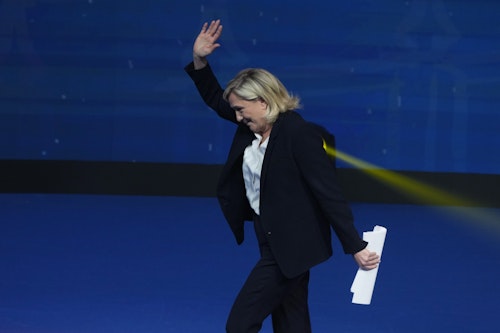
Marine Le Pen, leader of France's far right Rassemblement National, the largest group of French MEPs in the European Parliament, reacted belatedly to the clash in the Oval office, keen not to take sides openly while her party remains divided on the Ukrainian question, Euronews' Peggy Corlin writes.
“That two nations should defend their national interests, the vision they consider to be the most just for the world, doesn't seem to me to be anything extraordinary,” she said of the encounter between Ukrainian president Volodymyr Zelenskyy and US president Donald Trump.
The far-right figure seemed to discount a united European response as the continent's leaders gather tomorrow in London. “I don't know who the Europeans are,” she said, “there are countries, nations, and the European nations are obviously divided.”
While Ursula von der Leyen is invited to tomorrow’s summit she added: “If the European Commission wants to be at the forefront of continuing the war, then that will be a new bone of contention between us.... It won't be the first.”
Commenting on yesterday’s television images, she said: “That there is friction, words that go higher than one would like, these are things that happen in politics, but often behind the scenes. Yesterday, to everyone's amazement, they happened in public.”
According to Le Pen, the spat is only a “difficult moment” on the road to peace, which she sees as “inexorable, while some would like to continue the war”.
President Zelenskyy in London: Starmer positions himself as mediator, meeting with King Charles planned
The Ukrainian president touched down in London at midday after cutting short his visit to the US. Prime Minister Keir Starmer will welcome him at 10 Downing Street in an hour. He will surely reiterate his support for the Ukrainian cause, and discuss the conditions for a ceasefire in Ukraine.
This meeting comes ahead of a major summit hosted by Starmer in London tomorrow, where European leaders will discuss measures to “secure a just and enduring peace” in Ukraine.
Starmer swiftly reached out to both Trump and Zelenskyy following the Oval Office clash, assuring the Ukrainian president of his “unwavering support for Ukraine.”
Later this evening, President Zelenskyy will also meet King Charles – a signal of support from the monarch whose state visit invitation to President Trump was blazed earlier this week when Starmer met Trump in Washington.
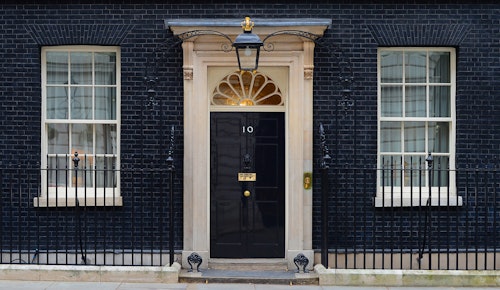
Front page crisis
The US is waking to some strong headlines this morning with Fox News emblazoning "'World War III' fears, after what the Washington Post described as a “fiery meeting” in the Oval office which Bloomberg states “leaves allies facing disaster" as "Western leaders scramble to back Ukraine" (CNN).
Meanwhile the European press has given its front pages over to the crisis, as this comprehensive review by Euronews' Evelyn Ann-Marie Dom attests.
Read the article here:
Press Review: European media reacts to White House spat
Zelenskyy left the White House without signing a deal after President Donald Trump and Vice President JD Vance berated the Ukrainian leader for being “disrespe…
The US view on using those seized Russian assets to fund defence of Ukraine
Use of confiscated Russian assets to fund the defence of Ukraine is likely to be discussed in forthcoming summits in London and Brussels as European leaders wrestle with solutions to the current crisis.
Support for the idea is strong in the US. Philip Gordon, Kamala Harris’ National Security Advisor, and Assistant Secretary of State for European and Eurasian Affairs during the Obama administration, has posted on X that Europe’s arguments against using those confiscated Russian assets are not compelling.
“It won’t deter countries from holding euros any more than seizing assets indefinitely (which they’re already doing ) would,” he argued in a post on X, adding that the euro wouldn’t be more at risk than the dollar since the US clearly supports the principle of asset seizure.
“The legal basis for seizure is sound so long as in context of countermeasures against Russia’s clearly wrongful international act,” Gordon wrote. “European concerns are not trivial- but with US support for Ukraine in doubt this is single biggest step Europe could take to save Ukraine and defend principle of nonaggression.”
The former German ambassador to Washington, Wolfgang Ischinger, is also a fan of the idea.
“I have always been in favor of seizing these assets, but lets make sure we give them to Ukraine to strengthen their Military, and to support reconstruction, not as compensation to the US!!!,” he posted on X.
Support for the idea is cross-party in the US, as US Republican Dan Crenshaw demonstrated when talking to POLITICO’s Power Play podcast, although he put the case in more Trumpian terms: “Why don’t you take the $200 billion in frozen assets and actually seize them? Europeans are like, ‘Oh well, we can’t do that.’ Then shut up. That’s why you don’t have a seat at the table.”
The European arguments against doing so are not compelling.
— Phil Gordon (@PhilGordonDC) February 28, 2025
It won't deter countries from holding euros in future any more than seizing assets indefinitely (which they're already doing) would.
The euro won't be more at risk than the dollar (just because most of the frozen… https://t.co/MqK3ugtnXf
Analysis: Orbán's veto threat could prompt the emergence of a coalition of the willing
As we just reported, Hungarian Prime Minister Viktor Orbán has penned a letter to his fellow leaders threatening to block any common language in support of Ukraine during next week's emergency EU summit. "It has become evident that there are strategic differences in our approach to Ukraine that cannot be bridged by drafting or communication," Orbán writes in a letter to António Costa, the president of the European Council.
The meaning of his words is unmistakable: Orbán is ready to use his veto power to prevent the adoption of fresh military support for Ukraine. As you probably know by now, under EU rules, any decision related to foreign policy requires the unanimity of the 27 member states. Hungary, in particular, has exploited this rule to extract concessions and water-down proposals, most notably a sweeping EU ban on Russian oil that has a tailor-made exemption for Hungary, Slovakia and the Czech Republic. Most recently, Budapest threatened to prevent the renewal of all sectoral sanctions on Russia, only to relent at the last minute.
But this time, Brussels can ill-afford wasting time in a back-and-forth with Orbán until all his demands are met. The new sense of urgency could prompt the emergence of a "coalition of the willing," a group of dedicated member states who would choose to work together to act more decisively in favour of Ukraine. The format would protect decision-making from individual vetoes, a key advatange. The European Commission could be involved while allowing the participation of non-EU countries, such as the UK, Norway, Iceland and Canada, all of which backed Volodymyr Zelenskyy after his spat with Donald Trump.
We saw a glimpse of this coalition earlier this week in Kyiv when a group of 13 Western leaders travelled to the city to mark the third anniversary of Russia's war of aggression.
Credit: European Union, 2025.
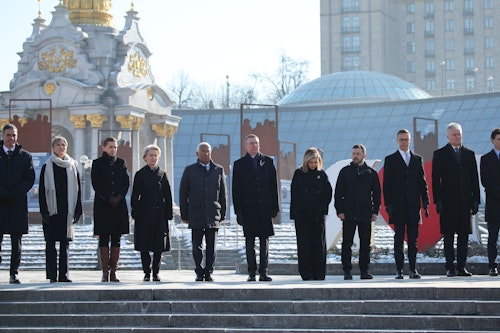
Russian reactions
There have been many reactions to Friday's Oval Office showdown, with one notable absence – Russian President Vladimir Putin. The Russian premier has almost certainly watched - and enjoyed - the spectacle, however.
But other Russian officials have weighed in.
Former president Dmitry Medvedev, now deputy head of the Russian security council, wrote on social media that Zelensky had received "a slap down in the Oval Office" and called for US military assistance to Ukraine to cease.
Today the Kremlin's foreign ministry spokeswoman has called Zelenskyy's trip to Washington a "complete diplomatic failure of Kyiv".
"With his outrageously rude behaviour during his stay in Washington, Zelensky confirmed that he is the most dangerous threat to the world community as an irresponsible instigator of a major war," Maria Zakharova (pictured) claimed, adding: "The sooner Kyiv and certain European capitals realise this, the closer a peaceful resolution of the Ukrainian crisis will be."
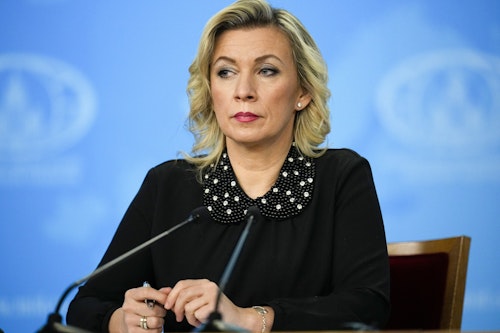
Lithuania calls for the confiscation of Russian assets. Has the moment arrived?
Lithuanian President Gitanas Nausėda has called on the EU to seize the assets of the Russian Central Bank that are currently frozen by sanctions. On a social media post shared on Saturday morning, Nausėda demanded the assets be used "immediately" to support Ukraine's army.
The issue of confiscation has been discussed in the past but gained significant traction in recent weeks after Trump launched negotiations with Russia and excluded Europeans from the process. Last week, Polish Prime Minister Donald Tusk pitched the exact same proposal.
Why is confiscation such a tempting idea?
First of all, because of the sheer size of the assets. According to the European Commission, their value stands at €210 billion, most of which is held at Euroclear, a Brussels-based Central Securities Depository (CSD). This number vastly surpasses the aid provided by both sides of the Atlantic since the start of the war: €132 billion from European nations and €114 billion from America.
Using Russian money would offer a quick, robust stream of revenue to replace American assistance, which is hanging by a thread after the Trump-Zelenskyy spat in the Oval Office. The EU budget has barely any space left after years of back-to-back crises and national budgets are under strain over debt levels and stagnant growth. Another source of liquidity is badly needed right now.
But the unprecedented idea faces several hurdles. The assets of the Russian Central Bank are sovereign property and therefore protected under international law. The European Central Bank has warned that expropriation could trigger financial instability, unleash litigation and make the eurozone less attractive for investors. Germany has voiced deep reservations. And Hungary, the most Russian-friendly member state, is vehemently opposed. This explains why so far, the EU has only moved to use the windfall profits generated by the frozen money (about €2 to €3 billion per year) while leaving the assets untouched.
Could the latest developments turn the tide in favour of confiscation?
Europe must act swiftly now.
— Gitanas Nausėda (@GitanasNauseda) March 1, 2025
First, on Ukraine:
- Use frozen Russian assets immediately to support Ukraine's military;
- Provide €20bn in additional defense aid, as proposed by @vonderleyen;
- Discuss a European peacemaker force.
Second, on the EU:
- Member states to invest…
Orban asks for no formal decision-making at summit
In another blow to Europe’s attempt at responding to the security threat to the continent, Hungarian Prime Minister Victor Orban is requesting the bloc make no formal decisions at a key EU summit on Defence policy, Euronews' correspondent Shona Murray reports.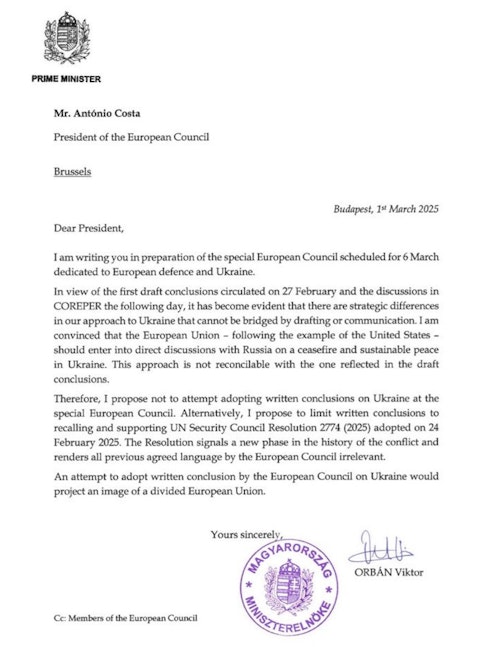
The move is likely to deepen further the crisis facing the continent.
27 member states are meeting in Brussels on March 6th to hammer out the most realistic solutions to respond to the imminent need for extra security in defence for the continent.
A senior EU source told Euronews that the final conclusions of the meeting will now need to be strengthened in light of the confrontation between US President Trump, and Ukrainian President Volodymyr Zelenskyy.
Yet, in a letter to EU Council President Antonio Costa, Orban cites “strategic differences” on our approach to Ukraine that cannot be bridged”.
Zelenskyy in London to meet Starmer - 'I want US more firmly on our side'
President Volodymyr Zelenskyy has just landed at London's Stansted Airport ahead of talks with UK Prime Minister Keir Starmer and a summit of European leaders in London. In a post on X, Zelenskyy has said: "America’s help has been vital in helping us survive, and I want to acknowledge that."
He thanks President Trump, says that though Ukraine is "very grateful" to the US for support, especially during the three years of full-scale invasion, "I want the US to stand more firmly on our side."
Ukraine is "ready to sign the minerals agreement" he said but he continues his call for US security guarantees.
"A ceasefire without security guarantees is dangerous for Ukraine," he says, echoing the theme that sparked friction in the Oval office.
US President Donald Trump wants to end the war, he says, adding: "But no one wants peace more than we do". "A ceasefire won’t work with Putin. He has broken ceasefires 25 times over the last ten years. A real peace is the only solution," he says. Zelensky says he "cannot change Ukraine’s position on Russia".
"The Russians are killing us. Russia is the enemy, and that’s the reality we face. Ukraine wants peace, but it must be a just and lasting peace. For that, we need to be strong at the negotiation table."
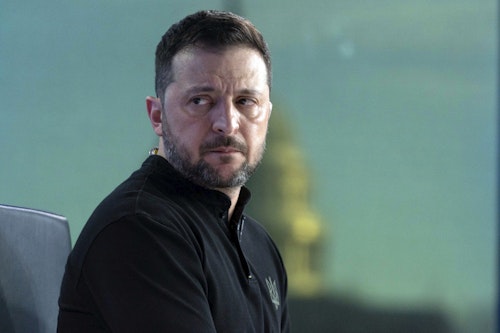
'Big concerns' regarding US aid to Ukraine, Euronews' Sasha Vakulina says
In an unprecedented argument live on TV, US President Donald Trump told his Ukrainian counterpart on Friday he should "be thankful," accusing Volodymyr Zelenskyy of being "disrespectful" and "gambling with World War III".
Euronews correspondent Sasha Vakulina, reporting from the Ukrainian capital Kyiv, said "the feeling here on the ground in Ukraine, in Kyiv is different. People are feeling that it is the Ukrainians who have been disrespected."
Vakulina said there are "big concerns" regarding US aid to Ukraine, and referred back to 2019 when Donald Trump allegedly withheld support to Kyiv in an attempt to pressure Zelenskyy to investigate his political opponent, Joe Biden, and his son, Hunter.
Concerns regarding US aid to Ukraine, Euronews’ Sasha Vakulina says
‘People are feeling that it is the Ukrainians who have been disrespected,’ Vakulina said reporting from Kyiv. #EuropeNews
The spotlight's now on Europe
That heated Oval Office exchange between Ukrainian President Volodymyr Zelenskyy and US President Donald Trump concerned the extent to which the US was prepared to backstop Ukrainian security, but behind it lay the security needs of Europe as a whole, eager to ensure that the US security blanket still extends to the whole continent.
Leaders meeting in London tomorrow face big questions. Can they pull the US back into the fold and logic of the deal-making? If not, are they prepared to stump up the necessary resources to sponsor the proper defence of Ukraine? Meanwhile stunned European leaders are assessing where the situation leaves the Western alliance generally.
What was expected to be a reasonably calm meeting in the wake of the US and Ukraine signing an agreement on raw materials has now turned into something of a date with destiny.
Europe on the brink: US-Ukraine rift puts spotlight on continent
Europe faces existential questions about its security future in the wake of the Oval office blow-up between presidents Zelenskyy and Trump. A summit in London…
Trump said Zelenskyy 'overplayed his hand' following White House meeting
Speaking after the meeting with his Ukrainian counterpart, Trump criticised Zelenskyy's stance, saying: "I think he very much overplayed his hand. We're looking for peace. We're not looking for somebody that's going to sign up as strong power and then not make peace because they feel emboldened."
He added that while Ukraine seemed determined to prolong the war, his administration wants to stop the killing. "2,000 people died this week. [...] Young Ukrainians and Russians", he said.
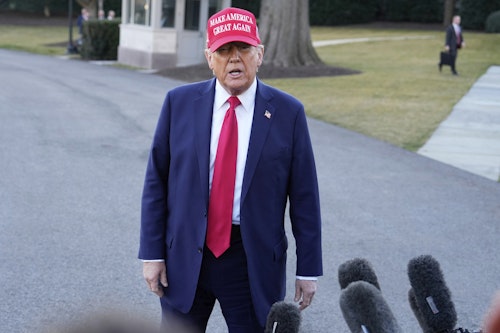
Trump dismissed Zelenskyy's strategy, stating that if the US did nothing, Ukraine would be forced to make peace. "He's dealing with a very weak set of cards", Trump repeated. "If we sign, he's dealing with a very strong set of cards, and then he doesn't want to make peace."
Trump argued that this was the core issue, saying, "I want immediate peace," and dismissed any prolonged involvement in the war, stressing that the US is not looking to go into a ten-year war and "play games".
Trump's insistence on a quick ceasefire contrasted sharply with Zelenskyy’s demand for security guarantees. "This is a man that wants to get us signed up and keep fighting. We're not doing that. Not for this country."
Trump says Ukraine is to either make peace or keep fighting alone
Trump and Zelenskyy spat deepens hours after the world witnessed a shocking shouting match erupt in the White House’s Oval Office as the two leaders met to sig…
Lindsey Graham called White House meeting a "complete, utter disaster"
Republican Senator Lindsey Graham, a former staunch supporter of Ukraine, called the White House meeting with Ukrainian President Volodymyr Zelenskyy a “complete, utter disaster."
The close Trump ally condemned Zelenskyy's approach to the meeting, and claimed "the way he confronted the president was just over the top."
"We want to be helpful. What I saw in the Oval Office was disrespectful, and I don't know if we can ever do business with Zelenskyy again," he told reporters as he left the White House following the spat.
Graham added that he had "never been more proud of the president," as well as of JD Vance, who he said stood up for the country.
When asked if Zelenskyy should step down, the South Caroline senator replied that "He either needs to resign or send somebody over that we can do business with, or he needs to change.”
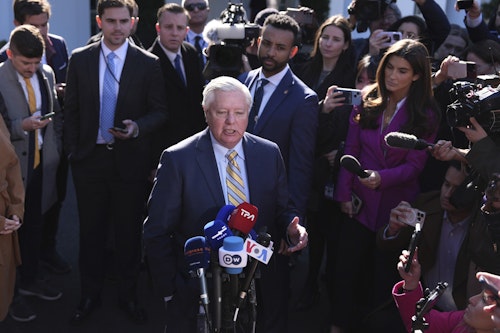
What about the frozen Russian assets?
On Russian frozen assets, an EPP official said: "I think it's very difficult. And even if it works it will take a very long time."
When asked whether Tusk was right to urge the EU to confiscate the frozen assets, the official said: "Tusk says a lot but read it through the polish domestic lens. They have presidential elections in May that he may very well loose", reports Euronews EU correspondent Maïa de La Baume.
'The front against using Russian assets is dissolving', senior EU sources tell Euronews
White House sources say the overriding assessment is that yesterday's confrontation was Zelenskyy’s fault and they blame Biden's weakness for the war starting in the first place, Euronews Europe correspondent Shona Murray writes.
"Biden's weakness in Afghanistan triggered Putin to invade Ukraine", said one. This is despite the fact that Trump agreed to the release of 5,000 Taliban prisoners from Afghan jails as part of his eagerness to end the US presence in Afghanistan.
"It would never have happened under Trump in the first place", said the source.
Meanwhile, senior EU sources are still of the view that US security guarantees remain crucial to support European troops.
Trump's apparent hostility to Europe is also baffling for them. "Leaders have tried everything to bromance and flattery – nothing is working." "Nobody knows why there is such affinity for Trump with Putin", they told Euronews.
"Everybody has been discussing security guarantees - and we have agreed that Europe would be the ones to do it on the ground but the US needs to be there to get us out of trouble with the air power the Europeans do not have."
"They are the ones with the Battle planes that can get us out of trouble." The only alternative is that we give Ukraine "'every possible tank we own, and we double defence spending". "If you are armed to the teeth – if you have every possible long range weapon you can do this."
What about Russian assets?
The source says the "front against the seizure of Russian assets is dissolving". We hope to see some movement on this; Belgium and Germany are the biggest opposition but under Merz, this could change. We hope Belgium will see the importance of the moment.
"Their concerns about the impact on Europe reliability as a safe place for investment are well understood, but if we have world war three, then Europe will be an even more unsafe place for savings."
The question is whether you give "Ukraine the entire lot, or do you provide money every time Russia attacks a power plant or an apartment and hand over the money for immediate reconstruction. We need decisions to be made tomorrow in London, and over the next two summits. The meeting last week in Paris was 'dreadful', and we will immediately need to revise the conclusions and scope of next week's defence summit."
Some criticism of Zelensky in the EU’s conservative ranks
One official from the conservative European People’s party with strong ties to many national governments said Ukrainian President Volodymyr Zelenskyy had "handled the situation very poorly", during his heated exchange with US president Donal Trump, Euronews EU correspondent Maïa de La Baume writes.
"It looked as if he didn't know who he was meeting in the White House and what he believes." Zelenskyy, the EPP official said, went to the meeting "like he goes anywhere and demands things while putting on some violence at the same time. It’s not gonna work this time."
The official insisted such incident will only emphasise Europe's current weaknesses in the Ukraine war and their dependency over the US.
"The Europeans now are gonna get excited that someone stood up to trump and eventually wake up to the same reality. They lack the courage to put troops on the ground in Ukraine and ultimately lack the capacity to fight any war without the United States. This is a void in no our collective history that we could not have imagined. It will be difficult to discern fact from fiction. We will see many mistakes made that will test Europe’s unity. No money, no troops on the ground, no real role for Europe regarding Ukraine. Sad truth."
Ukraine's voice needs to be heard – during and after the war, Zelenskyy said
Ukrainian President Volodymyr Zelenskyy has just shared on Telegram that he met with the Ukrainian community at the Ukrainian House in Washington.
"It is very important for us that Ukraine's voice is heard and that no one forgets about it, either during the war or afterwards. It is important for people in Ukraine to know that they are not alone, that their interests are represented in every country, in every corner of the world", he said.
He expressed gratitude again for the support "in this difficult time, for all your efforts for Ukraine and Ukrainians, and for your help - not only diplomatic and financial, but also political and prayerful."
Zelenskiy / Official
Український дім у Вашингтоні. Зустрівся з українською громадою. Для нас дуже важливо, щоб Україна звучала й ніхто про неї не забував ні під час війни, ні після…
What's the reaction in Ukraine?
Euronews has spoken to Denys Glushko, a Ukrainian journalist, who is worried about Trump's recent statements. "Trump accused Ukraine of being 'ungrateful' for American support, while Vance suggested that Kyiv was not showing 'enough respect' to its partners. These remarks reflect a growing shift in US rhetoric toward Ukraine, but they fail to acknowledge the core issue: Ukraine's fight is not about gratitude—it is about sovereignty. What happened in the Oval Office and the constant interruptions mixed with rudeness on the part of Trump and his Vice President JD Vance is a display of disrespect not only for the Ukrainian President, but for our entire nation", he said.
A week ago, Trump has called Zelenskyy a dictator with a low approval rating. These remarks have sparked unity and support in the country for their president, with his approval rating climbing to 57%, according to the Kyiv International Institute of Sociology (KIIS).
EU source: next steps remain to be seen
An EU source has told Euronews the next steps remain to be seen but that the a lot depends on tomorrow’s informal summit among EU leaders and the UK in London, reports Euronews Europe correspondent Shona Murray.
The evolution of the dynamics in the next days will be key - first test is of course London tomorrow.
On the table is perhaps a shift by Poland and Germany towards providing security guarantees for Ukraine in the absence of US support. "It’s all about countries like Germany and Poland switching gear as regards their position on security guarantees", the source said.
It is "Interesting that 20+ leaders put out a clear message of support to Zelenskyy yesterday", they said.
"Meloni ambivalent, Orban clearly and unsurprisingly on the other side."
Republican Congressman Lawler: 'Only winner today is Vladimir Putin'
Oleksandra Matviickuk, head of the human rights organisation Center for Civil Liberties, which was awarded the 2022 Nobel Peace Prize, told Euronews that "history will judge the Oval Office conversation from a distance of time."
She continued: "But it is already clear that the only beneficiaries of this conversation are Putin and his authoritarian allies Iran, North Korea, and China."
Republican Congressman Mike Lawler posted on X shortly after the clashes between the two Presidents, saying that "as someone who fundamentally believes that Russia, China and Iran are not our friends or allies and continues to believe it is important to support Ukraine, it was extremely short-sighted to engage in that type of exchange in front of the US and international press as you work towards an agreement. Sadly, the only winner of today is Vladimir Putin."
Today’s meeting in the Oval Office was a missed opportunity for both the United States and Ukraine — an agreement that would undoubtedly result in stronger economic and security cooperation.
— Mike Lawler (@lawler4ny) February 28, 2025
When this conflict ends, and it will end, it will require significant US and European…
Timeline: what happened in the Oval Office?
Zelenskyy arrived at the White House between 5 and 6 PM CET, greeting his US counterpart. The purpose of the meeting was for both countries to sign the rare earth minerals agreement, which Ukraine drafted last week.
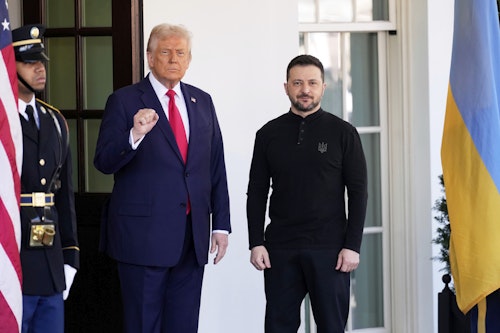
During the initial talks, Trump said, "We look forward to digging, digging, digging." The meeting, which lasted 50 minutes, started on good terms with Trump praising the deal and emphasising again that he wants the killing to stop. He called the deal a "big commitment from the US."
Trump also praised Ukrainian soldiers as "unbelievably brave" and added that his teams had held "very good discussions" with Russia on ending the war, unlike the Biden Administration. Trump again said that that if he were President, the war wouldn't have started, reminding that many parents have lost children in both Russia and Ukraine. Zelenskyy quickly countered saying "they came to our territory."
'No compromises with a killer'
Speaking at the Oval Office with some media representatives present, Zelenskyy has again stated there are "no compromises with a killer", talking about Russian President Vladimir Putin. Zelenskyy then praised US support and military equipment. Zelenskyy then raised the issue of around 20,000 Ukrainians who were forcefully deported by Russians and the exchange of POWs, showing Trump photos of POWs before and after Russian captivity. "There are rules during war", Zelenskyy said, accusing Russia of not obliging to these rules.
Both Presidents started taking questions from the media representatives, where Trump again has accused Europe of "doing much less". Zelenskyy disagreed, but the mood was still amicable, with both of them laughing.
Before talking about security guarantees, Trump insisted on closing the deal first. Zelenskyy repeatedly thanked the US and emphasised that Trump is on Ukraine's side. Trump, however, stated that Ukraine will have to make some concessions, such as territorial concessions and passing on NATO-membership. Trump offered himself as a mediator between both countries, adding that he hopes to be remembered as a peacemaker. "All I can do is see if I can get everybody to the table", Trump said.
'Do you own a suit?'
Zelenskyy was asked by a media representative whether he owns a suit, as "a lot of Americans have problems with you not wearing a suit to the Oval Office", the question said. Zelenskyy countered saying he will "wear a costume when this war is finished.
Trump then confirmed sending more weapons to Ukraine, but added that he hopes they won't be needed any longer. This statement seems to be irrelevant now, as the White House reportedly is considering not sending any further military support to Ukraine after the clashes between both Presidents.
Before, however, the pair has answered questions and despite some minor disagreements, have both laughed them off. Around 40 minutes in to the meeting, Vice President Vance got involved, which kicked off the spat between Zelenskyy and Trump and Vance.
Clashes at the Oval Office
US Vice President JD Vance was also present at the meeting at the Oval Office, having told Zelenskyy that the path to peace is engaging in diplomacy with Russia. His comments have set off the clashes that then unfolded shortly after.
"You should be thanking the president for trying to bring an end to this conflict", Vance said, emphasising Ukraine's problems in its war efforts. Zelenskyy countered saying the US is experiencing its own problems, which has triggered Trump to jump in with the accusation that Zelenskyy is "gambling with the lives of millions of people. You're gambling with World War III". Trump then proceeded to shout at Zelensky saying: "What you’re doing is very disrespectful to the country, this country."
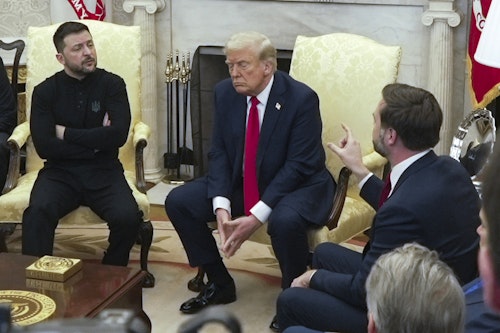
Trump continued after interrupting Zelenskyy, who was responding to another remark by Vance, saying that "your country is in big trouble. You’re not winning this. You have a damn good chance of coming out okay because of us." He then proceeded to add that if Zelenskyy could get a ceasefire now, "you take it".
"Of course, we want to stop the war", Zelenskyy countered, adding that for this, the country would need viable security guarantees. "You’ll get a ceasefire faster than an agreement", Trump replied.
Seize Russian frozen assets now, says French MEP
"We will need more than tweets supporting Zelensky and to Ukraine", socialist MEP Raphaël Glucksman told France Info radio.
”We will need actions from now on, strong gestures, and not just strong words… Glucksman urged the EU to "finally" seize the 209 billions of frozen Russian assets to be assigned for "productions in Ukraine , to the defence of Ukraine", Glucksman said.
About 210 millions in assets from the Central Bank of Russia are now held in the EU and those remain frozen because of EU sanctions imposed after Russia invaded Ukraine in 2022. EU governments have already used the profits from these assets to support Ukraine but confiscating those assets would be a much stronger gesture. However, doing so would require unanimity and Hungary as well as Germany are unlikely to agree, EU correspondent Maïa de La Baume reports.
Zelenskyy leaves White House after clashes – "A bad day for Zelenskyy. This is Europe's war now"
After clashes with US President Donald Trump and Vice President JD Vance, Zelenskyy left the White House.
The joint press conference between Trump and Zelenskyy was also been cancelled but could be rescheduled for Zelenskyy's next visit to the US. A senior US official later told Reuters that Trump has not ruled out the agreement yet but will only sign it when Ukraine is ready "to have a constructive conversation".
A US government source told Euronews Europe correspondent Shona Murray that yesterday was "a bad day for Zelenskyy. This is Europe's war now." He did say it could potentially be pulled back from the brink if there is a good deal on the table on minerals. "He [Trump] wants to show he's king," he concluded.
European reactions to an explosion
In the aftermath of the historic breakdown between Ukraine's president and his US counterpart and vice president live on TV on Friday, European leaders reacted broadly supporting the eastern European country.
"Your dignity honors the bravery of the Ukrainian people ... You are never alone dear President Zelenskyy," European Commission President Ursula von der Leyen posted.
Other top officials from the European Union, Friedrich Merz, who is likely to become Germany's new chancellor, and the leaders of France, UK, Poland, Spain, Ireland, Iceland, Germany, Lithuania, Moldova and Sweden chimed in with their support as well.
Read more on the reactions here:
European leaders unite behind Ukraine following Trump-Zelenskyy row
Just hours after Ukraine’s president and his US counterpart and vice president argued live on TV on Friday, European leaders voiced their full support for the…
Why was Zelenskyy in the US?
Zelenskyy travelled to Washington, D.C., yesterday to sign an agreement granting the US access to Ukraine's deposits of rare earth minerals. Ahead of the meeting, Zelenskyy confirmed that no security guarantees had yet been agreed upon as part of the deal—something he intended to push for during the talks.
Ahead of the clashes, Trump has told his Ukrainian counterpart that a deal allowing US exploitation of Ukraine's natural resources would be "very fair". A White House spokesperson confirmed Friday that the minerals deal has not been signed, after all.
Reports suggest that the agreement includes the creation of an investment fund for Ukraine's reconstruction, jointly managed by both countries. Ukraine will also contribute 50% of future revenue from state-owned mineral resources, oil, and gas, while the US has pledged long-term financial support, subject to its own laws. A key point of previous disagreement was an initial US request for $500 billion in mineral wealth, which Ukraine rejected.
Zelenskyy's follow up interview
Ukraine's President Volodymyr Zelenskyy repeated demands for security guarantees to end Russia’s invasion of his country just hours after the Oval Office spat.
Zelenskyy described the contentious spat with Trump as "not good for both sides" during an exclusive interview with Fox News just hours after the heated incident.
"I'm very thankful to Americans for all your support. You did a lot. I'm thankful to President Trump and to Congress bipartisan support. And I was always very thankful from all our people. You helped us a lot from the very beginning during three years of full-scale innovation. You helped us to survive," said Zelenskyy on Bret Baier's 'Special Report' segment.
Here's the full report:
Zelenskyy repeats demands for security guarantees after Trump spat
Ukraine’s President Volodymyr Zelenskyy repeats demands for security guarantees to end Russia’s invasion of his country just hours after Oval Office spat.
Recap: Trump and Zelenskyy Clash at White House
Good morning from Euronews. We're covering the aftermath of last night's clashes between Donald Trump and Volodymyr Zelenskyy in the White House's Oval Office. Zelenskyy was supposed to sign a rare earth minerals agreement with his US counterpart.
Trump accused Zelenskyy of being "not at all thankful" after the Ukrainian president pushed for security guarantees. "You're either going to make a deal, or we're out. And if we're out, you'll fight it out," Trump said, adding that he doesn't believe this option would be "pretty".
After Zelenskyy's request for a US security commitment, Vice President Vance called the Ukrainian president "disrespectful". This was quickly followed by Trump accusing Zelenskyy of "gambling with the lives of millions of people."
"You're gambling with World War III, and what you're doing is very disrespectful to this country, a country that's backed you far more than a lot of people say it should have," Trump said.
by Johanna Urbancik
US President Donald Trump and Vice President JD Vance berated Ukrainian President Volodymyr Zelenskyy for being "disrespectful" in an extraordinary Oval Office meeting. pic.twitter.com/2Zok2SeA59
— euronews (@euronews) February 28, 2025











